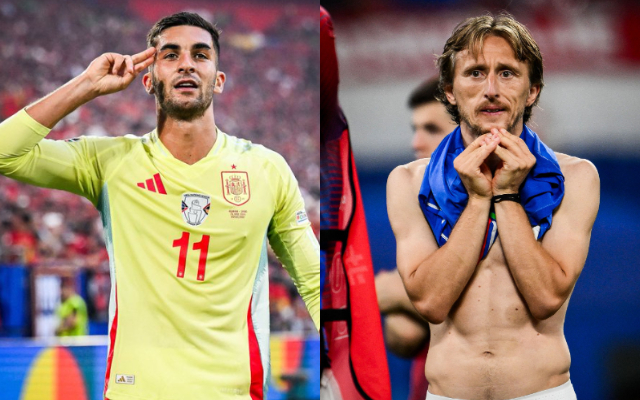
At some point, Croatian fans keeping an eye on proceedings in the Spain-Albania match being played simultaneously might have winced. Spain had started the game with 10 changes, yet those drafted in were competent enough to hold Albania at arm’s length and complete a third win in three group matches. A lovely pass from Dani Olmo was clinically finished off by Ferran Torres, who squandered another chance to add to the lead.
David Raya in Spain’s goal made one outstanding save from Kristjan Asllani and a fine stop from Chelsea’ Armando Broja, but you always got the impression that the Spanish had at least two more gears to move through. Spain could bring Alvaro Morata and Lamine Yamal off the bench, but when you looked at the Croatian contingent in tracksuits, it was hard to spot even one game-changer.
That Luka Modric did his utmost to prolong Croatia’s stay in the tournament is to his great credit. At 38, he wasn’t a regular starter at Real Madrid this past season, and the recent contract extension for 12 months was also made on the clear understanding that he will mostly be used off the bench to protect leads or try and recover lost causes.
For the Latest Sports News: Click Here

Croatia played quite well against Italy, showing verve and enterprise that was noticeably lacking against Spain. But as the eyes wandered across the pitch, all you saw was a group of men long past their best. There are exceptions like Josko Gvardiol, but the likes of Marcelo Brozovic, Mateo Kovacic, Andrej Kramaric and Ivan Perisic – who came off the bench – are not far behind Modric in the slow fade to black.
And there really are no replacements. Once a country where a striker like Alen Boksic couldn’t get regular starts because of Davor Suker’s excellence, Croatia haven’t had a reliable target man since Mario Mandzukic called it quits after the 2018 World Cup final loss to France.
When your population is less than four million – there are districts in India with more people – the supply of talent will never be steady. Spain, with nearly 49 million living there, don’t have that problem. From late bloomers like the 34-year-old Joselu to the 16-year-old Yamal, Spain had forwards from every part of the experience spectrum. Though only 24, Torres already has 19 goals for the national side.

Even a broad playing base is no guarantee of success. Italy’s failure to qualify for the World Cup since 2014 can be attributed in no small measure to the drying up of goal-scoring talent. The land of Gigi Riva, Paolo Rossi, Roberto Baggio, Alessandro Del Piero and Pippo Inzaghi cannot find a fox in the box.
The most prolific Italian marksman in recent seasons, Ciro Immobile, is now 34 and on the slippery downhill slope. Mattia Zaccagni, the Lazio man whose latest of late goals sent Italy into the next round, is 29, but it was just his seventh cap and first goal. No forward in the current squad has even 10 goals, which might explain why the feeling at the end of the Croatia game was more of relief than optimism about what lies ahead.
Spain may or may not go all the way, but like France, Germany, England, Belgium and other contenders, they have that most priceless of commodities – players who know the way to goal.
Also Read: Modric hints that this could be his last Euro appearance




